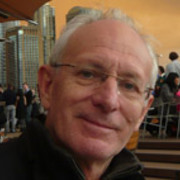
Michael Firth
Writer and director Michael Firth showed his versatility by mining drama in everything from high energy ski footage, to inspirational schoolteachers. Firth got hooked into filmmaking aged 19, after experimenting with 8mm film and making a documentary about a tribe of Indians, while living with them in the Brazilian jungle.
Firth had long been passionate about skiing; he realised that the obvious way to get into filmmaking was to make a ski movie, and add a storyline into the bargain. So he sank $80,000 of his money into the low budget Off the Edge. Shot on 16mm over two winters, the result became the first Kiwi film nominated for Best Feature Documentary at the 1977 Academy Awards. Born as an idea on a French ski field, the project took off after Firth invited two friends — American skier Jeff Campbell and Canadian Blair Trenholme — to New Zealand, so he could film them skiing and hang-gliding in the Southern Alps. Firth showed his uncompleted film in the United States where he eventually secured extra cash, added a soundtrack, and blew the footage up to 35mm.
Off the Edge's relatively wide local release and impressive sales helped spearhead the late 70s renaissance of New Zealand film, alongside Sleeping Dogs, which was released just a few months later.
Seven years passed before Firth's next feature, acclaimed psychological drama Heart of the Stag. Bruno Lawrence starred as a traveller in the King Country, who encounters an antagonistic farmer (Terence Cooper), and falls for her daughter (Mary Regan). Lawrence and Regan workshopped and contributed to the script, alongside Firth and the late Martyn Sanderson. Heart of the Stag was a rare local drama to deal with incest. The Los Angeles Times praised it as "electrifyingly good", and Lawrence's performance also won good notices. Metro magazine voted it the best Kiwi film that year, while the NZ Herald argued that it handled a delicate subject without compromise.
Firth reunited with many of the Heart of the Stag crew the following year: this time for Sylvia, the second film based on pioneer Kiwi educator Sylvia Ashton-Warner (the first was 1961 Hollywood studio effort Spinster, starring Shirley MacLaine). Ironically Firth had heard about Ashton-Warner from an American producer, while completing Off the Edge in Hollywood. Attempts to win funding stalled the project for seven years, before Firth agreed to cast Brits in three of the four main roles (the financial problems continued during the shoot). Eleanor David won raves as Sylvia, while Kiwi actor Mary Regan took away a GOFTA Award for her portrayal of Sylvia's friend Opal.
Firth worked with Ashton-Warner on developing the film, but she died before seeing the result. The NZ Herald called it “a milestone in the history of New Zealand film making.” American critics were also impressed. Village Voice scribe Andrew Sarris called Sylvia one of the best films of 1985, praising Firth for helping make Ashton-Warner "fallibly human', plus the "breathtaking" ensemble work of the four leads. Feminist critic Molly Haskell praised star David for conveying "the complex contradictions of the seemingly fragile, intuitive, and sensual woman" found in Ashton-Warner's writings.
Firth's next feature saw him jumping back into the world of outdoor adventure. The Leading Edge was a more commercially-orientated take on Off the Edge. The budget was raised through 1100 investors each putting in $1000. The film featured many of New Zealand’s star skiers on a fictionalised road trip through the country, climaxing with an Alpine Iron Man race. The Leading Edge also featured a cameo as a helicopter pilot by sometime pilot Billy T James.
Kiwi producer Barrie Everard drafted in Oscar-winning US music maestro Tom Whitlock (Top Gun) to mastermind a song for the soundtrack, in the hope of increasing the film's international appeal. But the 1987 stock market crash did not help sales. The Sunday Star called The Leading Edge “the expression of a man pouring his artistic creativity into recording the mountain wilderness that he loves in all its awesome moods of magnificence." Firth and (Stuart) Dryburgh take their cameras where no-one has gone before”. The Herald's Peter Calder found it a "more-than-impressive piece of work from a director with a distinguished pedigree".
Firth went on to direct and produce 1994's Vulcan Lane, a contemporary love story featuring Jo Davison (Shortland Street) and Marton Csokas. The first feature-length Kiwi production shot in the digital format, Vulcan Lane is little known on its home territory, but sold successfully to American cable networks.
Long drawn to sport, Firth went on to produce 52 half-hour episodes of extreme sports series Adrenalize, which sold to 50 territories. He found himself working six and a half day weeks corralling footage shot across New Zealand. "I began to realise this country just goes off every weekend — it's insane: people falling off mountains and flying down on mountain bikes and kayaking." He was also proud of fishing series Take the Bait, for which he provided most of the camerawork and narration.
Firth spent many years directing commercials and promotional films, including trips to Asia and the United States. He also spent time as one of the directors of Rotorua's Magma Short Film Festival.
Michael Firth passed away on 9 October 2016.
Profile written by Ian Pryor
Published on 16 October 2009; updated on 10 October 2016
Sources include
Michael Firth
Off the Edge website (broken link). Accessed 10 October 2016
'Michael Firth: Oscar-nominated action man...' (Video Interview) NZ On Screen website. Director Andrew Whiteside. Loaded 24 March 2014. Accessed 25 March 2014
Peter Calder, "The Leading Edge' (Review) - The NZ Herald, August 1987
Jonathan Dowling, Review of Heart of the Stag - The NZ Herald, 2 February 1985
Molly Haskell, Review of Sylvia - Vogue (US edition), July 1985
Andrew Sarris, Review of Sylvia - The Village Voice, 4 June 1985
Unknown writer, 'Taking it to the edge' (Interview) - Tempo issue 15, 28 August 1987, page 3
The Leading Edge press kit